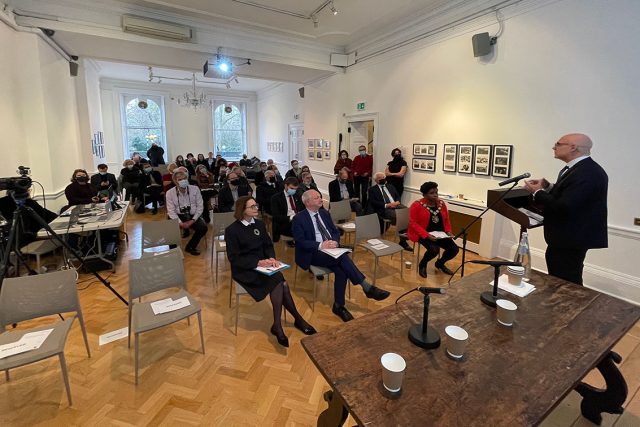At a Conference in London
There is a WWII tragedy which left a burden of deep sorrow in the Italian community in UK: the sinking of the prison ship Arandora Star, with the death of 446 italians. This tragedy was at the centre of an international commemorative conference held in London on 30thNovember to mark the 80thanniversary of the event.
Following Italy’s declaration of war on France and Great Britain (10th June 1940), Italians in England became ‘enemy aliens’ overnight. In the chaotic turmoil that followed, many Italians were hurriedly deported or sent to internment camps. Much suffering and injustice were caused by this indiscriminate and blunt policy. On the 2nd July 1940, the prison ship SS Arandora Star, a British converted ocean liner, was torpedoed by a German U-Boat and sunk rapidly off the north-west coast of Ireland. The ship was carrying around 1,500 deportees bound for internment in Canada. Over 800 people perished, more than half of them Italian.Anumber of bodies were washed ashore, many were never recovered.
For decades this awful and possibly avoidable tragedy was silently overlooked both in England and Italy. In England, it raised difficult questions about the government’s internment policy and the treatment of civil prisoners, many of whom had no political affiliation or actively opposed the Fascist regime. In Italy, it was a reminder of the disastrous Fascist war and the belligerent stance of Benito Mussolini and his acolytes. For too long its painful memory remained confined to the Italian communities in Britain and the Italian towns which had paid a disproportionate toll. Historian Terri Colpi spoke of ‘pockets of affect’ in which the memories of those who had died were held in the hearts of their loved ones.
The Conference – hosted by the Italian Cultural Institute and supported by the Mazzini-Garibaldi Club – was opened by Katia Pizzi, Director of the Italian Cultural Institute, and Domenic Pini, Chair and founding trustee of the Arandora Star Trust. The Italian Ambassador to the UK Raffaele Trombettaaddressed the audience speaking of the importance of remembrance. Following on, the Mayor of Camden, Councillor Sabrina Francis, in her speech remembered the many Italians, political refugees andeconomic migrants, who settled in London’s Little Italy in the Borough of Camden and made their contribution to London’s cultural and economic life.
The Conference was organised in five sessions. MP Marco Longhi and On. Massimo Ungaro, Member of the Italian Parliament, spoke during the political session. Rachel Pistol, King’s College London, Robert Rumble, Imperial War Museum, and Terri Colpi, University of St Andrews, were the speakers of the ensuing academic session. The papers presented focussed on different aspects related to the SS Arandora Star sinking, the British internment and deportation policies, and the remembering and memorialisation of the tragedy.
The afternoon session, Memorials and Minorities, was opened by Bruna Chezzi, University of Cardiff, who spoke about the first National Memorial of the Arandora Star unveiled in 2010 at the Metropolitan Cathedral Church of St Davidin Cardiff. Ronnie Convery of the Archdiocese of Glasgow and Honorary Italian Consul spoke about St Andrew’s Cathedral Italian Cloister Garden, a memorialcommemorating the victims of the Arandora Star and the Scottish Italians who perished in the tragedy. Inaugurated in 2011 under the patronage of the Roman Catholic Archbishop of Glasgow Mario Conti, the Italian Cloister Garden is the largest monument to the disaster ever unveiled. A commemorative plaque reads «May the dead of the Arandora Star, and all who have lost their life in war, rest in peace. Non vi scorderemo mai».
The cultural session, introduced by Nicola Gallaniof the British Film Institute and Chair of the Mazzini-Garibaldi Club, saw the actor Tom Conti and television producer and screenwriter Dominic Minghella sharing with the audience testimonies based on their own family history. Touching accounts of personal memories. This was followed by the screening of the documentary film SOS ArandoraStar produced by Italian Canadian Anna Chiappa. A final plenary session drew the event to a conclusion.
For its merit and significance,the Conference has been awarded a presidential medal by Italy’s President Sergio Mattarella. A distinguished acknowledgment to the organising Committee.Consolidating its success, the Arandora Star Trust is now considering how to ensure that the ArandoraStar tragedy will be forever remembered. In recent times local communities, both in Britain and Italy, have unveiled public memorials to the victims. In London, the sinking of the SS Arandora Star and the names of 241 London Italians who lost their lives on 2nd July 1940 are remembered at St Peter’s Italian Church in Clerkenwell. Yet London lacks a memorial within an open public space. Eighty years have passed since that shockingly cruel day. All the survivors are no longer with us. The victims continue to long for recognition and perhaps there is no real answer to such a tragedy except in faith and acceptance. Perpetuating and honouring their memory in a spirit of healing and reconciliation may finally help in bringing some closure.
Andrea Del Cornò























